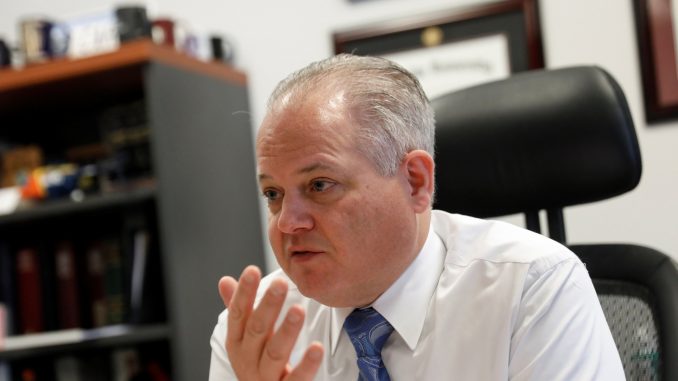
BENSALEM, Pa. — Dozens of police departments in the U.S. have been granted new powers, or are seeking them, to check the immigration status of people they arrest, aiding President Donald Trump’s broad crackdown on people living in the country illegally.
Since Trump took office in January, 29 departments have joined a special program under which they are deputized to perform some tasks of immigration agents, doubling its size in 10 months, according to the U.S. Immigration and Customs Enforcement (ICE) agency. And the administration hopes that is just the beginning.
Documents obtained through a Freedom of Information Act request show that the administration has also had contact with scores of additional jurisdictions about the program, and 38 of those told Reuters in interviews they have submitted applications for the program or are potentially interested in joining.
The program, known as 287(g), deputizes local officers trained by ICE to use federal records to vet arrestees they suspect of being in the country illegally and then turn them over to federal agents if they are.
The Department of Homeland Security has said in the past that police forces taking part in the program have flagged tens of thousands of people for deportation.
The broad expansion of the program comes as Trump seeks to accelerate arrests and deportations of people living in the United States illegally. The large number of departments expressing interest in the program has not been previously reported.
Most of the police departments that have joined, or are seeking to join, the program have relatively small populations, typically fewer than 100,000 residents, with small immigrant populations. In contrast, the roughly three dozen so-called “sanctuary cities” that have limited their cooperation on immigration enforcement have a median population of half a million people and larger foreign-born populations, according to a Reuters analysis.
Under President Barack Obama, the 287(g) program was downsized and its funding reduced, with critics saying it eroded trust of police in immigrant communities. By the end of fiscal year 2016 only 32 agreements were left in place, down from a peak in 2010 when some 70 jurisdictions were participating. Today, 60 departments in 18 states participate.
Alamance County had its 287(g) program terminated in 2012. The federal Justice Department sued Sheriff Terry Johnson that year over allegations his office discriminated against Latinos at traffic stops and checkpoints.
The judge dismissed the case, but in 2016 the county entered into a settlement with the government to avoid an appeal, committing to “bias-free” policing.
Johnson said in a phone interview that he was contacted by ICE about rejoining the 287(g) program earlier this year. He applied, and in March he sent a letter to Tom Homan, the acting director of ICE, saying it was “one of the best law enforcement programs” he had ever been involved with during his 45-year career.
Johnson is not alone in his interest to restart in the program. Three-quarters of the agencies that have already signed 287(g) agreements or are interested in doing so are in counties that voted for Trump in 2016, according to a Reuters analysis of electoral data.
The township of Bensalem, Pa., just half an hour up the road from Philadelphia, is one of those hoping to join the 287(g) program.
Bensalem Director of Public Safety Fred Harran said any immigrant in the country illegally who commits a crime, even a misdemeanor like shoplifting or possession of a small amount of drugs, should be considered for deportation, and he welcomes help from ICE.
“If deporting you out of this country when you commit a crime is a tool at my disposal, you are darn right I am going to use it,” Harran said.



